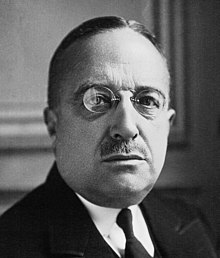Andre Tardieu
| André Tardieu | |
|---|---|
 |
|
| 67th Prime Minister of France | |
|
In office 2 November 1929 – 21 February 1930 |
|
| President | Gaston Doumergue |
| Preceded by | Aristide Briand |
| Succeeded by | Camille Chautemps |
|
In office 2 March 1930 – 13 December 1930 |
|
| President | Gaston Doumergue |
| Preceded by | Camille Chautemps |
| Succeeded by | Théodore Steeg |
|
In office 20 February 1932 – 3 June 1932 |
|
| President |
Paul Doumer Albert Lebrun |
| Preceded by | Pierre Laval |
| Succeeded by | Édouard Herriot |
| Personal details | |
| Born |
André Pierre Gabriel Amédée Tardieu 22 September 1876 Paris, France |
| Died | 15 September 1945 (aged 68) Menton, France |
| Political party |
Democratic Alliance (1914–1932) Republican Centre (1932–1936) |
André Pierre Gabriel Amédée Tardieu (French: [ɑ̃dʁe taʁdjø]; 22 September 1876 – 15 September 1945) was three times Prime Minister of France (3 November 1929 – 17 February 1930; 2 March – 4 December 1930; 20 February – 10 May 1932) and a dominant figure of French political life in 1929–1932. He was a moderate conservative with a strong intellectual reputation, but became a weak prime minister at the start of the worldwide Great Depression.
Tardieu was a graduate of the elite Lycée Condorcet. He was accepted by the even more prestigious École Normale Supérieure, but instead entered the diplomatic service. Later, he left the service and became famous as foreign affairs editor of the newspaper Le Temps. He founded the conservative newspaper L'Echo National in association with Georges Mandel.
In 1914 Tardieu was elected to the Chamber of Deputies from the département of Seine-et-Oise, as a candidate of the center-right Democratic Republican Alliance (Alliance Démocratique - AD). He retained this seat till 1924. From 1926 to 1936, he represented the département of Territoire de Belfort.
When World War I broke out, Tardieu enlisted in the army, serving as an infantryman till 1916. He then returned to politics. He served as Georges Clemenceau's lieutenant in 1919 during the Paris Peace Conference and as Commissioner for Franco-American War Cooperation. On 8 November 1919, he became Minister of Liberated Regions, administering Alsace and Lorraine, serving until Clemenceau's defeat in 1920.
...
Wikipedia
